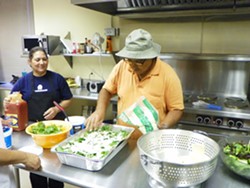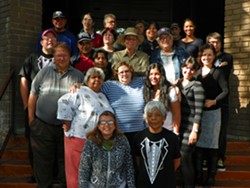- The Clubhouse has control over its acceptance of new members. Membership is open to anyone with a history of mental illness, unless that person poses a significant and current threat to the general safety of the Clubhouse community.
- Members choose the way they utilize the Clubhouse, and the staff with whom they work. There are no agreements, contracts, schedules, or rules intended to enforce participation of members.
- All members have equal access to every Clubhouse opportunity with no differentiation based on diagnosis or level of functioning.
The Clubhouse has a large central room lined with big windows that looks out to a yard full of trees. This is the business center where computers, work tables, TV and library are open to all. Clubhouse staff and members work side-by-side on all tasks. The board on the wall is updated every day and signing up for work is voluntary. Everything from cooking the meals, posting on Facebook, producing the monthly newsletter or cleaning the bathrooms gets done. The modern kitchen and dining area serves breakfast and lunch, and includes a snack bar that is self-moderated. There is a wellness area with gym equipment and even a morning yoga class. Culinary classes and special projects are are often a part of the daily activities. The Clubhouse serves about 45 people total, averaging about 25 a day. I've been in a lot of nonprofits during the last twenty years. Sometimes, there's a feeling when you walk in the door that a place is special. I felt it when I came to the Clubhouse. There's a pervading calm, an atmosphere of respect and cooperation. Everyone gives of themselves to help one another. I can't imagine the struggles these folks have gone through. Those who suffer mental health issues often also encounter poverty, physical illness, loneliness... Sometimes this is an invisible disease or one we try to ignore. Texas is currently ranked 50th of the 50 states in per capita funding for mental health. Cutbacks continue to happen at the state level while mental illness is on the rise. Maybe our new year's resolution should be to become more aware of people with mental health problems and support places like the Clubhouse where those who struggle can find a path to living a full life. When I left the Clubhouse, I couldn't find my car keys. I spent about five minutes in the parking lot digging through my purse and my coat. Jerry poked his head out of the Clubhouse door and asked if everything was all right. I told him I'd lost my keys and better look inside. Jerry said, "I've lost a lot of things in my life, but of all those things, I missed my mind the most. And, you can use that." So, I am. And, I found my keys on the front counter. If you want to help, donate--money, books, supplies, vehicles. Visit SAClubhouse for more information. The success stories will fill your heart with hope in this season that should mean joy for everyone. San Antonio activist and nonprofit veteran Laura Carter believes in enabling the community to work from the heart, not just the wallet. Laura is currently Communications Director at Providence Catholic School where her job includes working with traditional, creative, and social media public relations and marketing.




